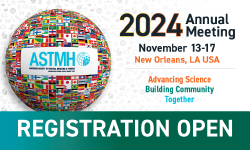| Past two years | Past Year | Past 30 Days | |
|---|---|---|---|
| Abstract Views | 1172 | 710 | 51 |
| Full Text Views | 32 | 3 | 0 |
| PDF Downloads | 37 | 4 | 0 |
The Effects of Hemoglobin Genotype and Abo Blood Group on the Formation of Rosettes by Plasmodium falciparum-Infected Red Blood Cells
Rachanee Udomsangpetch
Rachanee Udomsangpetch
Department of Pathobiology, Faculty of Science, Mahidol University, Medical Research Council Laboratories, Department of Immunology, University of Stockholm, Bangkok, Thailand
Search for other papers by Rachanee Udomsangpetch in
Current site
Google Scholar
PubMed
Search for other papers by Rachanee Udomsangpetch in
Current site
Google Scholar
PubMed
James Todd
James Todd
Department of Pathobiology, Faculty of Science, Mahidol University, Medical Research Council Laboratories, Department of Immunology, University of Stockholm, Bangkok, Thailand
Search for other papers by James Todd in
Current site
Google Scholar
PubMed
Search for other papers by James Todd in
Current site
Google Scholar
PubMed
Johan Carlson
Johan Carlson
Department of Pathobiology, Faculty of Science, Mahidol University, Medical Research Council Laboratories, Department of Immunology, University of Stockholm, Bangkok, Thailand
Search for other papers by Johan Carlson in
Current site
Google Scholar
PubMed
Search for other papers by Johan Carlson in
Current site
Google Scholar
PubMed
Brian M. Greenwood
Brian M. Greenwood
Department of Pathobiology, Faculty of Science, Mahidol University, Medical Research Council Laboratories, Department of Immunology, University of Stockholm, Bangkok, Thailand
Search for other papers by Brian M. Greenwood in
Current site
Google Scholar
PubMed
Search for other papers by Brian M. Greenwood in
Current site
Google Scholar
PubMed
The mechanisms by which the hemoglobin genotype AS protect against severe malaria are not fully understood. We have investigated the possibility that protection might be achieved through an inability of red blood cells (RBC) with the AS genotype to form rosettes with RBC infected by Plasmodium falciparum. No evidence was obtained to support this hypothesis because RBC with the AS genotype formed rosettes with wild isolates of P. falciparum as readily as RBC with the AA genotype. However, the previous finding that parasitized RBC form rosettes more readily with RBC belonging to group A or B than with RBC belonging to group O was confirmed even in fresh clinical isolates.
Author Notes
| Past two years | Past Year | Past 30 Days | |
|---|---|---|---|
| Abstract Views | 1172 | 710 | 51 |
| Full Text Views | 32 | 3 | 0 |
| PDF Downloads | 37 | 4 | 0 |








